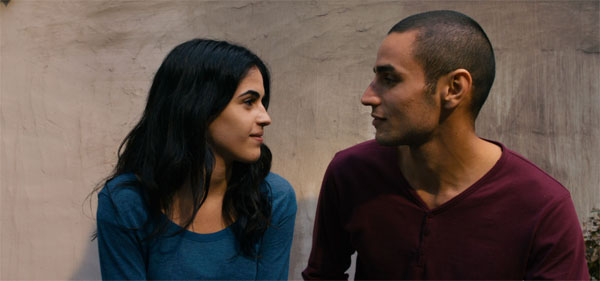“A screed is a screed no matter its superficial genre trappings, as evidenced by Hany Abu-Assad’s Omar, whose thriller machinations are merely a vehicle to deliver narrow-minded political preaching,” argues Nick Schager in the Voice. “Boasting none of the nuance that defined his last look at Israeli-Palestinian tensions, 2005’s Paradise Now, director Abu-Assad’s latest charts the fractured odyssey of twentysomething Palestinian Omar (Adam Bakri). When not baking bread, Omar spends his days scaling the security wall—a symbolic reflection of how Israeli policy has divided his life—in order to see girlfriend Nadia (Leem Lubany), and occupies himself at night conspiring with best friends Tarek (Eyad Hourani) and Amjad (Samer Bisharat) to kill an Israeli soldier.”
“Humiliation and brutality at the hands of an Israeli patrol spur Omar to initiate said sniper attack,” writes Nicolas Rapold in Film Comment. “But rather than embarking on a story about the Endless Cycle of Senseless Violence, Assad sticks with his strikingly handsome protagonist, played by Adam Bakri, whose clean-cut looks, coolly proud bearing, and smartly fitting jacket suggest a svelte action hero. But Omar is only human as he endures the suspicion of his two brothers-in-arms and the foxy, mischievous girl he keeps climbing the towering West Bank barrier to visit. Assad keeps things hard to read; this a film in which that Israeli interrogator is, at several points, the most trusting person in sight.”
“Bakri has charisma to burn,” grants Time Out New York‘s David Fear, “but the complexity of Abu-Assad’s previous movies is traded in for weak genre thrills. One hopes this film gets his need to make an episode of 24 out of his system and he can get back to doing what he does best.”
At Slant, Tomas Hachard argues that “the film is a profound, if dispiriting, companion piece to Paradise Now. In that film, Abu-Assad’s characters, feeling bereft of any options, turn to terrorism, a trajectory that left the film open to accusations of being in support of such behavior. In Omar, though, the director is uninterested in the validity of terrorism; the film ultimately portrays Omar’s attack as insignificant in its consequences, whereas the Israelis are slowly shown to have an almost indomitable upper hand in their battle with Palestinians.”
For Richard Porton, writing for Cinema Scope, “the film’s impact is… compromised by its failure to resolve whether it wants to be a nail-biting thriller, a trenchant character study, or an indictment of recent Israeli policy. Truth be told, it’s most successful as a character study.”
Howard Feinstein for Filmmaker: “While Abu-Assad dissects his characters’ unpredictable behavior, he takes us along on a gratifying tour of the town–it appears that almost everything is shot on location–documenting the tactile quality of its stone buildings and paths and the rhythms of daily life in a small urban milieu in a would-be country ripped apart by a fence.”
At Artinfo, David D’Arcy notes that, at the NYFF press conference, someone asked Abu-Assad “whether such a grim look at Arab-Israeli relations would play in Israel. Of course it will. Bear in mind that the futility of containing Palestinian frustrations with overwhelming violence was the subject of The Gatekeepers, which played on Israeli television. Abu-Assad said that he hoped his film would lead to a conversation. What do people who can’t trust each other talk about?”
A Special Presentation in Toronto, Omar screens today and tomorrow at the New York Film Festival. Earlier: Reviews from Cannes, where Omar won the Jury Prize of Un Certain Regard.
Update, 10/19: Michael Koresky at Reverse Shot: “Abu-Assad’s Paradise Now was an attempt at humanizing suicide bombers that seemed aimed specifically at western audiences; via fairly conventional narrative strategies, the film sought what was for most viewers unthinkable—identification and empathy with violent Arab extremists, not five years after the 9/11 attacks on the World Trade Center…. The smoother Omar is similarly engaged with making the viewer experience and feel the kind of rage and fear of helplessness that must come with living under the thumb of an occupying regime. Though the film toys with us by gesturing at dividing our sympathies between Omar and Agent Rami (who’s painted as a sometimes likeable father figure and workaholic), there’s finally no question about who we are meant to identify with.”
Update, 11/7: Right here in Keyframe, Anna Tatarska interviews Abu-Assad.
NYFF 2013 Index. For news and tips throughout the day every day, follow @KeyframeDaily on Twitter and/or the RSS feed. Get Keyframe Daily in your inbox by signing in at fandor.com/daily.




